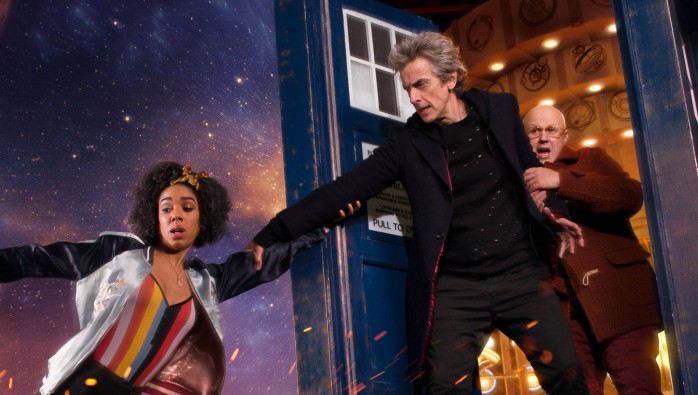Why Does ‘Doctor Who’ Need A Gay Companion?
The next companion in Doctor Who will identify as “gay,” and this gives me mixed feelings.
I’m not alone. Breathless reports of Bill’s sexual orientation have been saying all at once: celebrate diversity/this isn’t too important/BEST IDEA EVER/well duh, no big deal.1
Doctor Who showrunner Steven Moffat, who exits the series after this upcoming season, says it’s not a big deal: “Just to be clear, we are not expecting any kind of round of applause or pat on the back for that. The correct response should be ‘what took you so long?’”
But as Doctor Who fans know, rule no. 1 is: “The Moffat always lies.” If they truly thought this weren’t a big deal, wouldn’t the best response to this question be “no comment”?
Anyway, we haven’t yet seen the first story of series 10, which begins Saturday, April 15. This could end up being a few quick allusions before we move on. And the notions of same-sex, bisexual, transgender, or other alien sexual pursuits are not strange to Doctor Who:
- We’ve already enjoyed the dapper and winsome Jack Harkness, a time agent who “dances” with any sex or species. In series 1, he even kissed the Ninth Doctor on the lips.
- We’ve wept for a timeline version of Clara Oswald, trapped in/as a Dalek, who briefly alludes to experimenting with bisexuality in series 7. However, Clara Prime in series 8 is solidly in love with her boyfriend Danny—a story with a tragic ending, though it does not quite match the romance of Rory and Amy Williams that also ends in series 7.
- We’ve encountered lizard-woman Vastra and her human consort Jenny, who share a “marriage” relationship, but one that felt, to excuse the expression, a bit cold-blooded.
However, culture creators will keep trying. For whatever goals (though biblical Christians have our suspicions), the rising religion of Sexualityism2 is at least fashion of the decade. Its influence affects story choices both in esoteric culture and in broader popular culture. In the past years, we’ve seen avatar Korra and her friend Asami hold hands (and get creator-retconned as bisexual), Supergirl’s sister Alex try lesbianism, Gobber from How to Train Your Dragon 2 creator-retconned as “gay” by an actor ad-lib; and most recently, LeFou from Beauty and the Beast also creator-conned as “gay,” resulting in predictable controversy.
 In a sense, biblical Christians can try to appreciate their Sexualityist neighbors’ enthusiasm. Imagine if we suddenly became the flavor of the decade. Imagine if popular culture began inserting Christian characters into shows, even with little references or praises. It would feel kind of cool. It could even feel like our own religion was similarly on the cultural rise.
In a sense, biblical Christians can try to appreciate their Sexualityist neighbors’ enthusiasm. Imagine if we suddenly became the flavor of the decade. Imagine if popular culture began inserting Christian characters into shows, even with little references or praises. It would feel kind of cool. It could even feel like our own religion was similarly on the cultural rise.
But does this kind of religion-insertion truly help to make the story or character better?
What exactly about Doctor Who would change if Bill has same-sex attraction? If we get SSA-related stories, won’t that detract from the stories’ explorations of relatable human themes? And if we don’t, why bother with the change at all? Consider the following options:
Option A: Character gets only a brief mention of Sexualityism.
If as Moffat told the Mirror, we only occasionally hear about Bill flirting with girls or some-such, before we take off into time travel, this makes the Sexualityism gesture shallow.
Imagine you are even loosely affiliated with Sexualityism. Wouldn’t you want more?
 Imagine, again, that this is a Christian character. Would you feel cool, or only pandered to?
Imagine, again, that this is a Christian character. Would you feel cool, or only pandered to?
This is the similar effect of “gay” characters in CW shows, such as Supergirl or Legends of Tomorrow. From Curtis Holt to Sara Lance, you may occasionally meet their “lovers.” But these other characters or the very concept of their sexual proclivities don’t otherwise influence the main plot at all—certainly not as much as, say, Oliver Queen’s romantic relationships, including one with Sara herself. These stories’ central romantic plots show near-exclusive emphasis on traditional male/female relationships.
Option B: Character gets time for own relationship subplot.
When you make your story come second to the promotion of a particular religion—be it Christianity or Sexualityism—the story will almost certainly become weaker.
You’re no longer honestly trying to tell a story. You’re trying to please. Or trying to preach.
I don’t have time to feel drawn alongside the character as a human being if the character, through his/her own choices or the plot’s manipulations, is telling me what to think or do.
In fact, fans even today tend to resist what they feel is an impulse to pander to particular groups, whether different Sexualityism factions or human ethnic groups. Witness the public backlash against Star Wars, Marvel Comics, and Star Trek: Discovery, after some seemingly grandstanding diversity-focused casting decisions. I’ve seen fans even angrily push back against critics of Marvel’s Iron Fist (on Netflix) and Ghost in the Shell (2017), who decided that these shows ought to have cast Asian actors.3
In theory, there’s a way around this: by making the character highly relatable. Recently a friend viewed the anime series Yuri On Ice. Its story explores a (male) ice-skater named Yuri who strives to win gold. Meanwhile, he becomes attracted to his (male) trainer, Victor. According to my friend, this show holds the secret to making “gay” relationships relatable and empathetic in storytelling. Yuri on Ice treats these as normal, without a hint of agenda, even while equally portraying and praising traditional male/female romances. But this story puts the characters’ relatability up front and their Sexualityism in the background.
By contrast, Western TV shows seem unable or unwilling to take this approach. From what I’ve seen, if these shows put a “gay” character in the spotlight, it’s always with great fanfare and brass bands and press releases. These creators apparently feel that their privilege, to create fun stories many people want to see, is not enough. For whatever reasons, they seem to want to please the right sorts of people—the fashionable, progressive, and moral Sexualityist people.
Again, this is like a moralistic religion: they seem to want the praise of men, and thus cannot do this “good deed” in secret. Truly, they have received their reward.
The problem is that this strategy could only go so far, even in an anime series. If you’re trying to render a realistic world in which “gay” relationships have always been normal, you can’t zoom in too close or else you’ll see pixels and wireframe.4 How long could this “act like it’s all normal” game keep up? You would need to deny the story’s version of the world any semblance of other religions, or the heritage of exclusive male/female marriage.
Option C: Character is relatable, realistic, and follows Sexualityism?
However, let’s say a story is determined to show 1) a realistic world with fantastical elements included), 2) realistic characters, including “gay” heroes, 3) emphasized “gay” relationships, and all while 4) avoiding propaganda, 5) acting like it’s al normal, 6) keeping this “good deed” in secret, and not broadcasting that the story is Socially Groundbreaking.
That seemingly idyllic approach may still not work for several reasons:
First, if the goal is to show the actual “gay” views of life, you’ve just eliminated one real conflict from this story. Much of their story involves (in their words) the fight for marriage equality and, more recently, the right to identify as your own gender. If the story pretends away the politics, the story has just “appropriated the culture.” All the happy bits and no sad bits, including villains such as Christians or conservatives. That’s sentimentalism.
Second, the story faces an impossible character development dilemma. It can:
- Eliminate all relationship drama from the “gay” character’s life story. Good result: You show the character and his/her romantic relationships in a positive light. Bad result: You make this person even less relatable to others, because this person is too perfect.
- Or else deal with this drama outright, including fights and breakups and court battles. Good result: enhanced story realism, because these conflicts do happen to all sorts of people. Bad result: you risk irritation from, or being ignored by, Sexualityism leaders because the story is honestly showing that this religion won’t solve all your problems, regardless of whether their religious enemies are seen.5
 Third, the story will soon hit the same problem as with Yuri: the simulated characters will run up against a black wall painted with yellow tape. What happens if your characters want to have a family? Many stories with straight couples avoid these themes because, as with real family drama, these themes take over everything else. Therefore this new story is also blocked from them—and thus the story, again, cannot explore certain scenarios.
Third, the story will soon hit the same problem as with Yuri: the simulated characters will run up against a black wall painted with yellow tape. What happens if your characters want to have a family? Many stories with straight couples avoid these themes because, as with real family drama, these themes take over everything else. Therefore this new story is also blocked from them—and thus the story, again, cannot explore certain scenarios.
Any of these three character options faces challenges per their own stories’ expectations. Notice we haven’t even yet discussed biblical views of sexuality and same-sex attraction.
What should Christians expect?
I’ll close with a few predictions:
- We will see more “gay” casting in popular culture. Christians won’t help matters by either raising a row over it, or acting like this is no big deal. Let’s see these for what they often are: story creators’ attempts to have their cake at the fashionable religion’s sacred table, and eat their cake by not actually messing with the characters too much.
- For now, stories that actively explore the political and religious conflicts of Sexualityist individuals will have limited influence, similar to the subculture of Christian movies.
- Some stories, such as Yuri On Ice, will break the formula and find success. But they’ll be limited to certain genres, including lighter-skewing stories that, by design, aren’t meant to do a lot of moral world-building or in-story deconstruction and philosophizing.
- Some stories will take a safe route of having no romantic relationships at all, almost to unrealistic effect. This seemed to be the approach of Rogue One: A Star Wars Story.
For Doctor Who, I’ll predict the showrunners won’t do much real Sexualityism propaganda with Bill. Not even Moffat is such a fool to dispose of the history and expectations of Doctor Who, including its exploration of relatable relationships such as male/female romance, or the Doctor being a man. Beloved stories that have been around this long must follow their own rules consistently. As with the real world, you can only rebel against canon for so long.
- See the BBC’s own article, and this one from the Mirror, and this one from The Guardian. ↩
- “Sexualityism” is my term for the religion that near-absolute human autonomy, or self-choice, determines how you identify and act both sexually and as a human being. It is a religion with its own self-“deity,” its own anthropology, “fall,” “law,” redemption, and even devils. ↩
- Unfortunately this kind of backlash has led and will lead to outright racism and actual hatred. Too many people feel they must fight the fire of sinful Sexualityist religion by resorting to these older and equally nasty sins. ↩
- You can get away with other strange-is-new-normal versions of our contemporary world only if you play the strange addition for laughs, as in The Muppets films and TV shows. ↩
- This was the approach taken by Marvel’s Jessica Jones, to great effect. Attorney Jeryn Hogarth, attempting to divorce her previous “wife,” shows herself to be a ruthless woman who abuses other people. Even Kilgrave, who has the power to control people’s thoughts, is repulsed by her. ↩












































I think we also need to look back at the Speculative Love series from a few years ago. “Kissyface” is generally not the main attraction of scifi and fantasy anyway; while it may be mentioned or even form one of the emotional cores of a story, if one really wants romance, one should go to romantic stories. For Doctor Who in particular, there is a long history of downplaying romantic relationships in the Classic Series. Davison (Five) wasn’t even allowed to hug his companions in case fans got the wrong idea. Compare that to Ten’s relationship with Rose!
Doctor Who isn’t supposed to be about romance–it’s “all of time and space, everything that ever happened or ever will.” So either they’ll downplay Bill’s sexuality or they’ll push it at the expense of good stories. Either way, somebody’s gonna get ticked.
This is true. I mean I liked the Rose subplot (though to be fair, I prefer Nine over Ten) but romance (of any sort) shouldn’t be a big draw in sci-fi. Romantic subplots abound in shows like Deep Space 9, but never did the whole series revolve around them. A few individual episodes yes, totally, particularly in the Kira/Odo saga (which I found to be very well done), but never the whole show. And besides, Ten mooning around after he lost Rose was a bit much in my humble opinion. He became a completely different man, I suppose that is realistic, but the whole show began to be about “I’ve lost my true love, what shall I do?” If Moffat’s smart, he won’t pull that sort of stunt again for any sort of romance, gay, straight, whatever. Ten’s sorrow did drive the story at the expense of perfectly good stories, and I hope not to see that again.
Ditto. Any companion who came after Rose was always going to be Not-Rose to some fans, but the Doctor loses people. It hurts, it’s hard, but he has to keep moving, cause that’s how it is.
I feel like the Doctor should love every person who shares his box, not romantically, of course, but he should love them all and be upset by their leaving. What I’ve seen of Twelve’s sorrow over the Ponds is what I’m saying. He carries them all in his hearts, a special little spot just for Rose, sure, but not just her.
Exactly. I mean, Eleven’s speech to Colonel Manton in “A Good Man Goes to War” is very protective, very fierce, and still based on friendship and not romance. “Trying to get to me through the people I love” doesn’t have to be romance.
There’s a post going around about how when the Empire tried to get to Luke Skywalker, they did it through his friends, not a love interest….
I’m going to take a moment to say I don’t know why a live-action Ghost in the Shell needs to exist, especially when it’s just rehashing the other movies’ plots. We had that, it was called Solid State Society, and it was a definite downgrade from Stand Alone Complex.
Anyway, I think it’s gonna happen by means of the Yuri-on-Ice route (more like Yaoi on Ice, amirite). People generally watch romance-driven shows for the happy-nice-time feels (Speaking of, WHERE’S MY NATSUME’S BOOK OF FRIENDS REVIEW, BURNETT?) I think most non-romance-driven gay points will be mostly by mentioning route, but that’s not really any different than a lot of het relationships in non-romance, they usually just mention if it’s brought up at all.
Random update: I got around to watching Yuri on Ice, and it’s got some nice music that I wanted to share. This song is “In Regards to Love: Agape,” and it only shows a fanart of Yurio looking bishounen and so is SFW: https://www.youtube.com/watch?v=Xt_VZ13voCQ
I’m sorry… but sexuality diversity is natural, sorry to disappoint. You seem to be wearing blinders about what is really at issue here… and that’s “Why do you care?”.
LGBT aren’t promoting a belief, we just want to live our lives like everyone else.